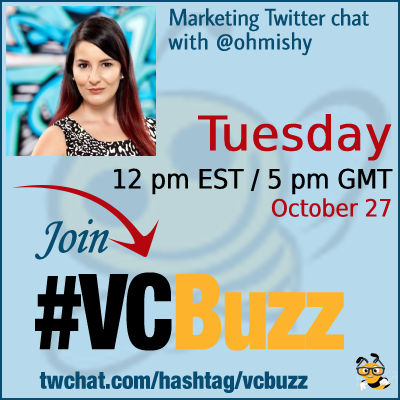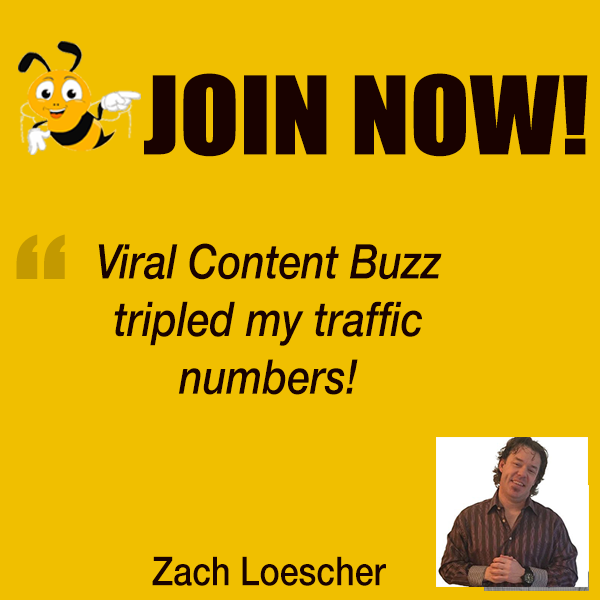
Knowing your audience has obvious benefits: You get an idea of who your target customer is and how to best serve their needs.
This results in a better product, better on-site US, and better content.
So why do so many brands never invest time or effort in researching their target audience?
Some may think they already have a clear idea of who they are targeting. Others just don’t think there’s anything to research.
Both cannot be more wrong.
Audience research is a never-ending process. And knowing your audience can boost your marketing results.
Let’s discuss!
***Add #VCBuzz chats to your calendar here.
***Please sign in here to follow the chat -> twchat.com/hashtag/vcbuzz
About Michelle Wilding-Baker @ohmishy
Michelle Wilding-Baker @ohmishy is a globally award-winning digital marketing leader who specialises in data-first customer acquisition (owned/paid/earned), SEO and content strategy.
Michelle is head of digital and content marketing at @Freesat_tv
Connect to Michelle on Linkedin
Questions we discussed
Q1 How did you become a digital marketer? Please share your career story!
Graduated with first-class honours in Communication Studies (Journalism). As I learned to adapt offline journalism to online principles (i.e no walls of text and on-page optimisation)… I dabbled with content marketing.
I very quickly was exposed to and picked up SEO (Content then Tech), Inbound Marketing, Paid. And 11 years on I’m loving being channel agnostic; however specialising in acquisition, Tech SEO and Content.
A1 I knew from the beginning I would end up in between marketing/sales and technology, and guess what it is where I ended up….#seo #vcbuzz
— Arnout Hellemans (@hellemans) October 27, 2020
@ohmishy got into digital space from a software engineering background. This help when you are working for a technical product/offerings and need to market it #vcbuzz
— Salman Saleem (@salmanlashkari) October 27, 2020
I resigned from IBM after 23 years and built some websites for #local businesses using experience I got from building the largest horse site online.
— Gail Gardner (@GrowMap) October 27, 2020
Fell into managing PPC accounts for those businesses and many others. Did that for 5.5 years. Saw where that was going. #VCbuzz
A1: I majored in Advertising through Journalism & Mass Communication (now Communication and Information). That was pre-digital, so I gradually moved into digital along with the company I worked for at the time. "Hey, figure this out!" #vcbuzz
— Jaime Shine ?️ (@jaimeshine) October 27, 2020
Q2 Why is knowing your audience so important?
In essence, marketing is all about effective communication and strategic/tactical activities to promote the buying or selling of a product or service. So the audience is at the very heart of it. How can you “market” if you don’t know who your audience is and where?
A2 You can't offer what your customers need or want if you don't know your audience.
— Gail Gardner (@GrowMap) October 27, 2020
The more you know, the better you can offer products and services they'll be willing to buy. #vcbuzz https://t.co/KsSDlZJsCb
A2 In SEO, knowing your audience helps with understanding which keywords they will use that have the right search intent. And understanding search intent will mean that you will map keywords to the correct pieces of content.#vcbuzz
— Boyd Norwood – nozzle.io (@boydnorwood) October 27, 2020
A2) Without knowing your audience's needs/wants, it makes it impossible to effectively entice them towards your offering. You will also waste lots of time and money in the process. #vcbuzz
— Itamar Blauer (@ItamarBlauer) October 27, 2020
A2 Because you need to reach them, so you need to know the why, the how and the what. What they are looking for and why? I call this the big why? A question every marketer / seo / business person should ask themselves. Just my 2 cents #vcbuzz https://t.co/sZjT5ppH4D
— Arnout Hellemans (@hellemans) October 27, 2020
Q3 How to get to know your audience better? Is it possible for new websites?
Absolutely, but it may just take some time if you’re starting from scratch online and that’s okay. Try to utilise traditional marketing to understand foundations like market research (YouGov etc) if you exist offline. Then also look at competitors.
A3 The best way to get to know your audience is by ASKING THEM. But don't overwhelm them. Use marketing automation and send SHORT emails to get answers by what they click on. Mine your search phrases and your support chats & emails to see what they want. Listen on social #VCBuzz https://t.co/lr0iNdNscA
— Gail Gardner (@GrowMap) October 27, 2020
The irony of online sometimes is businesses believe their audience and competitors are based off their offline data/trends and it’s not always the case. Online can be very different to these assumption. So you have to start collating your own research/data.
A3 Information is anywhere, just talk to customers, your family, friends, use tools like https://t.co/tdalIWCHpK, https://t.co/amp6qp0jJm and just google your product(s) and check the PAA boxes, it's everywhere. #VCbuzz
— Arnout Hellemans (@hellemans) October 27, 2020
Add surveys onsite and in your email touch points to better understand interests. And the holy grail is keyword research #SEO. The search landscape is rich with needs and intent, so tap into that to start building a picture of audience pain points and intentions.
A3 Short polls are another great way to get to know your audience better. They are very popular in our Mastermind Community and work well for lead generation.
— Gail Gardner (@GrowMap) October 27, 2020
I often take polls in Facebook groups because they're quick & high visibility. #VCBuzz
Also let’s talk analytics whether it’s Google Analytics or Adobe etc. to track your website’s user activity and find out demographics, page interests, engagement, goals etc. A DMP (data management platform) can help you to start segmenting audience groups.
A3: Ask your audience about their biggest challenges and how you can help solve them. Ask them directly, analyze your data and listen on social. #vcbuzz https://t.co/KftxguwYn2
— Jaime Shine ?️ (@jaimeshine) October 27, 2020
I also find often that audiences differ not only between digital channels but the actual platforms. E.g on social… Twitter vs Facebook vs Instagram!
A3 As part of the process of getting to know your clients, read through all of the questions they are asking. To do this, just read through dozens (or hundreds) of People Also Ask questions that Google serves up in the SERPs to your audience. #vcbuzzhttps://t.co/UrYL0YV7bT pic.twitter.com/c2lI26jh53
— Boyd Norwood – nozzle.io (@boydnorwood) October 27, 2020
A3) Find out where they hang out online and engage with them to better understand their needs/wants. I made a video about this a while back: https://t.co/t7zzI31VGC #vcbuzz
— Itamar Blauer (@ItamarBlauer) October 27, 2020
This is especially important for #B2B Do a great survey = super content, incoming links & insights into what your customers REALLY want.
— Gail Gardner (@GrowMap) October 27, 2020
Also participate in and analyze surveys done by others in your industry & related niches. #VCBuzz https://t.co/q6yezCsgn0
Q4 How to go from knowing your audience to applying that knowledge in practice?
Metrics and measurement are marketing biggies. Campaign engagement and site testing will help you assess performance against benchmarks and if messaging is having an impact. Use content and SEO strategies to start speaking to different personas, and how they respond.
A4) Create content that appeals to them. Once you know their pain points, you can provide the answers that they're looking for. #vcbuzz
— Itamar Blauer (@ItamarBlauer) October 27, 2020
I also think that once you’ve found your core audience, it’s so important to find “more” of them or similarities via Look-A-Like audiences to help improve paid marketing efforts. Continue to scale and optimise for efficiency of course.
A4 Creating knowledge content, solving your audience their problems. #vcbuzz
— Arnout Hellemans (@hellemans) October 27, 2020
Also if your content is working well on SEO, social or email, try to tap into WHY it’s working and do more of it. And do certain audiences respond better at certain times to due to lifestyles? These nuances all play a part to your strategy.
A4 It takes time and effort but if you answer ALL of there questions in the form of content, videos, images, etc. your audience will begin to see you as the expert and trust you and, therefore, come to you when they need your product or service. #vcbuzz
— Boyd Norwood – nozzle.io (@boydnorwood) October 27, 2020
A4b LISTEN to your customers and if it is economically feasible, sell what they want to buy!
— Gail Gardner (@GrowMap) October 27, 2020
The businesses I'm most loyal to are the ones who stock what I tell them I'll buy from them. That happens sometimes — and I'm still their customer because of it. #vcbuzz
A4: Once you know your audience's pain points, show how your products and services can solve them. Create content answering their questions and showcasing how you can improve their lives. Can you add ancillary solutions to help them even more? #vcbuzz https://t.co/yHew6EUI42
— Jaime Shine ?️ (@jaimeshine) October 27, 2020
#PPC (Search Ads360); Display, #NativeAdvertising (Outbrain etc) or LinkedIn, Twitter! ? Even on Gmail ads, YouTube via Google Ads #VCBuzz
— Michelle Wilding-Baker (@ohmishy) October 27, 2020
Q5 What are your audience research tools?
SO many. I love a diverse set! Analytics suite (GA/AA); SEO Tools for KW research (@semrush, @ahrefs, Google + Bing Search Consoles) and @hellemans mentioned AnswerthePublic earlier to understand what audiences are looking for online and at what query stage.
Social media monitoring and measurement tools, as I mentioned earlier, you’ll tend to find audiences share similarities yet equally differ across each platform.
A5b And @BuzzSumo is the most popular tool among #writers They have a great post on How To Create A Content Strategy Your Audience Wants https://t.co/kGpJGF2hJ0 #VCBuzz
— Gail Gardner (@GrowMap) October 27, 2020
I’m also really into visual analytics like HotJar, Crazy Egg and split-testing tools (Optimizely). You can also set up a lot of engagement rules for onsite via Google Tag Manager. For quick learnings I split test messaging on PPC.
Our previous analytics chats:
- Get to Know Your Audience with @Bill_Slawski
- How to Make Google Analytics Dashboards More Actionable with @AnnieCushing
- How to Analyze if Your Pages Are Keyword Relevant with Eric Enge @stonetemple
- How to Use Google Analytics to Understand & Improve Your Social Media Marketing with @DanaDiTomaso
- Social Media Analytics Twitter Chat with Ruxandra Mindruta @RuxandraRux of @Brandwatch
- Data Analytics Basics with Kristina Sorrelli @KCSorrelli
- Analytics to Improve Conversion: Twitter Chat with Amel Mehenaoui @amelm



